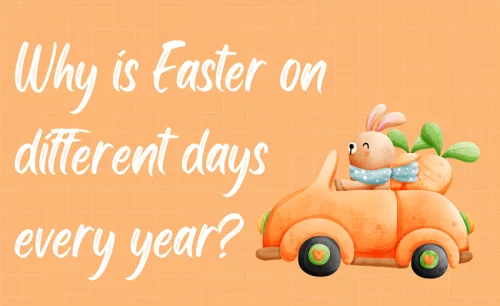Easter is one of the most important religious celebrations in Christianity, marking the resurrection of Jesus Christ. It is a movable feast and occurs on different days every year. This article will explore the history behind why Easter is celebrated on different dates, the factors that determine when Easter is observed, and how the date for Easter is calculated. In this article, we will discuss why is easter on different days every year.
The History of Easter:
The history of Easter can be traced back to the early Christian church. The exact date of the resurrection of Jesus Christ is not recorded in the Bible, but it is believed to have occurred on a Sunday following the Jewish holiday of Passover. The Jewish holiday of Passover is based on the lunar calendar, and it was celebrated on the 14th day of the Hebrew month of Nisan. The early Christians also celebrated the resurrection of Jesus Christ on the Sunday following Passover, and this tradition continues today.
The Council of Nicaea:
In the early days of Christianity, there was no standardized method for determining the date of Easter. Some churches celebrated Easter on the same day as Passover, while others celebrated it on the first Sunday following the first full moon after the vernal equinox. This caused confusion and disagreements among different churches.
In 325 AD, the Council of Nicaea was convened by Emperor Constantine to address the issue of determining the date of Easter. The council agreed that Easter should be celebrated on the Sunday following the first full moon after the vernal equinox, which is typically on or near March 21st. This method of determining the date of Easter is known as the Gregorian calendar.
The Eastern and Western Churches:
Despite the decision made at the Council of Nicaea, there were still disagreements between the Eastern and Western churches regarding the date of Easter. The Eastern Orthodox Church continued to use the Julian calendar, which was slightly different from the Gregorian calendar used by the Western Church. As a result, Easter was often celebrated on different dates by the two churches.
In 1582, Pope Gregory XIII introduced a reform of the Julian calendar, which became known as the Gregorian calendar. The Gregorian calendar was adopted by most Western countries, but the Eastern Orthodox Church continued to use the Julian calendar. This meant that Easter was still celebrated on different dates by the two churches.
The Factors That Determine the Date of Easter:
The date of Easter is determined by a combination of factors, including the lunar cycle and the vernal equinox. Easter is observed on the first Sunday following the first full moon after the vernal equinox. The vernal equinox is the moment when the sun is directly above the equator and the length of day and night are equal. This usually occurs on March 20th or 21st.
The lunar cycle is also a factor in determining the date of Easter. The date of Easter is determined by the full moon that occurs after the vernal equinox. This is because the Jewish holiday of Passover, which was the basis for the early Christian celebration of Easter, is based on the lunar calendar.
Calculating the Date of Easter:
The date of Easter can be calculated using a formula called the computus. The computus is a complex mathematical formula that takes into account the lunar cycle and the vernal equinox. The formula was developed by the early Christian church to ensure. That would be celebrated on the correct date each year.
The computus calculates the date of Easter by first determining the date of the vernal equinox. The formula then calculates the date of the full moon that occurs after the vernal equinox. Easter is observed on the first Sunday following the first full moon after the vernal equinox.
Conclusion:
The date of Easter is determined by a complex formula. That takes into account the lunar cycle and the vernal equinox. This formula was developed by the early Christian church to ensure. That would be celebrated on the correct date each year. Despite the efforts to standardize the date of Easter, differences in the calendar used by different churches have resulted in the celebration of Easter on different dates. However, regardless of the date, It remains a significant religious celebration for Christians around the world.







